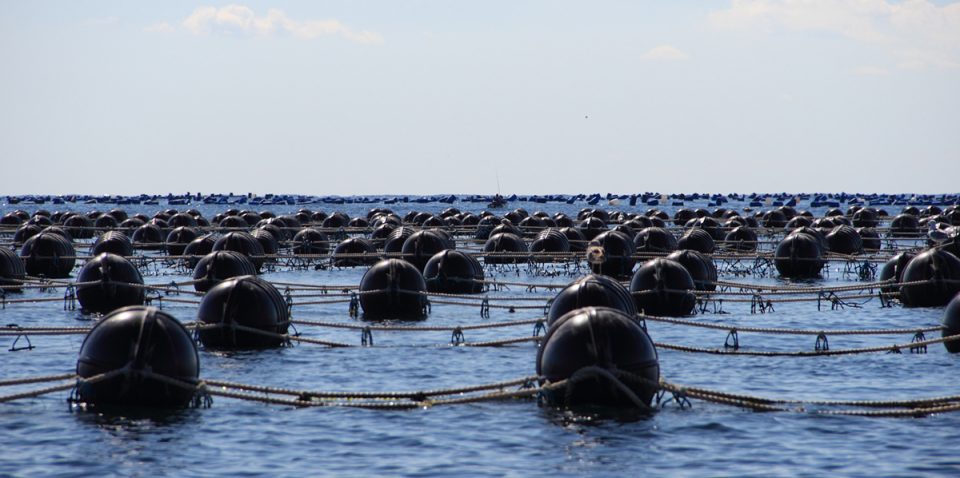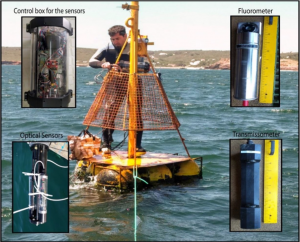Through the GAIN project, funded by the EU Horizon 2020 Fund, Novel precision aquaculture technology allows for eco-intensification of bivalve culture in Portugal

This is the fifth article in our series on precision aquaculture. This is part of a larger three-part series on sustainable aquaculture intensification in Europe, focused on precision aquaculture, sustainable feeds, and circular economy. This work from the GAIN project is funded by the EU Horizon 2020 Fund. Each part in this series takes provides an introductory glance at the three topics, then explains how outputs from the GAIN project are contributing towards it, including the applicability to industry and governance.
The production of cultured bivalves is reliant on optimum water quality conditions, often beyond the farmers’ control. Specific water quality events, like algal blooms, nutrient upwelling or urban runoff can lead to regulatory closures of bivalve sites to prevent contaminated bivalves from entering markets, causing severe economic consequences for the farmers. The scale and intensity of these water quality events are difficult to predict because they are caused by complex combinations of multiple and interacting factors.
Partners in the GAIN project have developed novel precision aquaculture tools to help forecast water quality events affecting bivalve culture, including site closures. These tools use machine learning to model environmental conditions for better prediction and management decisions. Their precision aquaculture techniques for bivalves includes integrating data sources into a cloud-based platform that allows for real-time monitoring.
Understanding and predicting water quality events provide bivalve farmers with an early warning so that they can respond and adapt their management strategies to minimize losses. This will allow bivalve farmers to intensify their production in a sustainable and eco-conscious way, while maintaining the safety and high quality of the final consumer product.
The team involves researchers in the Algarve, Portugal, coordinated by Sagremarisco Ltd., which has collaborated with other partners in the GAIN project, including IBM Research and Longline Environment Ltd., to develop precision aquaculture tools incorporating local conditions and accounting for variation between sites.

While trials conducted in Portugal are restricted to a specific site, the tools can be easily adapted for bivalve farms in other locations because it uses machine learning to base predictive models on each specific site.
The team used an array of data for modelling, including in-situ environmental sensors, satellite and open-ocean data, weather data and other waterbody attributes like temperature and current patterns. These attributes were compared with data collected during historical site closures to identify conditions that predict closures.
The modelling and machine learning also incorporated requisite data for statutory requirements for state and EU legislation, including the Water Framework Directive (“good ecological status”) and the Marine Strategy Framework Directive (“good environmental status”). Storing the data in a centralized cloud-based solution will also help farms attain sustainability certifications.
Their research found that closure conditions vary hugely between sites, highlighting the need for modelling techniques and machine learning that use data specific to each site and its history to predict closure conditions. Their precision aquaculture tools used semi-automated machine learning to enable this level of accuracy.
They are currently in the final stage of testing their products for the industry, including AquaPrime, a platform for monitoring day-to-day farming activities that closes the loop between environmental sensors and production data, and AquaSense, which delivers precision aquaculture for sustainable eco-intensification by combining sensor data with predictive modelling.
Follow the Advocate on Twitter @GAA_Advocate
Now that you've reached the end of the article ...
… please consider supporting GSA’s mission to advance responsible seafood practices through education, advocacy and third-party assurances. The Advocate aims to document the evolution of responsible seafood practices and share the expansive knowledge of our vast network of contributors.
By becoming a Global Seafood Alliance member, you’re ensuring that all of the pre-competitive work we do through member benefits, resources and events can continue. Individual membership costs just $50 a year.
Not a GSA member? Join us.
Authors
-
John Icely
Managing director of Sagremarisco-Viveiros de Marisco Lda / a Principle Researcher at CIMA, Universidade do Algarve
-
Bruno Fragoso
Scientific researcher for Sagremarisco and a Ph.D. candidate at CIMA, Universidade do Algarve
-
Alexandra Pounds
Assistant researcher in aquatic food security, Institute of Aquaculture, University of Stirling


